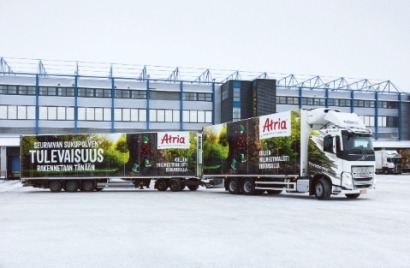
The biogas plant will be built in the vicinity of Atria’s production plant in Nurmo. Preparatory ground work and foundation work are already underway. The biogas plant will produce renewable domestic energy and various types of biofertilizers using manure from farms in the South Ostrobothnia region as well as agricultural and food industry byproducts.
Upon completion, the plant will produce about 100 GWh of sustainably produced liquefied biogas. The project has received an environmental and construction permit, and the Ministry of Economic Affairs and Employment has granted investment aid for it. In addition, an application for EU Recovery and Resilience Facility (RRF) investment aid has been submitted to expand the current investment.
If the additional investment aid is granted, the larger plant would be able to process a wider range of agricultural and food industry byproducts and would annually produce around 125 GWh of liquefied biogas.
“The Nurmo biogas plant is the first step in building Suomen Lantakaasu’s national production plant network and 1 terawatt-hour liquefied biogas production capacity. It’s great that we can move forward with the Nurmo biogas plant project, which we acquired in the spring and which has been in the pipeline for a long time, and that the project is advancing with investment aid from the Ministry of Economic Affairs and Employment. The role of investment aid is critical to the project’s success,” notes Leena Helminen, Valio’s Director, Sustainable Business Development.
“The Nurmo biogas plant is a great example of the food industry’s and the energy industry’s collaboration on a major step towards a more sustainable energy and food system that utilizes all agricultural and food industry byproducts and creates new sustainable business,” she continued.
Completion of the Nurmo plant will improve the availability of renewable fuel for heavy transport. St1 has launched construction of its own liquefied biogas (LBG) refueling network by recently opening two of the first refueling stations for heavy transport in Mäntsälä and Iittala.
“We will open more new liquefied biogas stations this year, and we are aiming for a nationwide network by 2030 while also building an LBG refueling network in Sweden and Norway. A sufficient refueling infrastructure is needed so that transport companies and end customers can invest in low-emission heavy transport fleets. It is also very important for building the value chain that the legislation ensures the incentives for biogas production and they are not constantly changed,” says Matti Oksanen, Director, Gas Business at St1.

